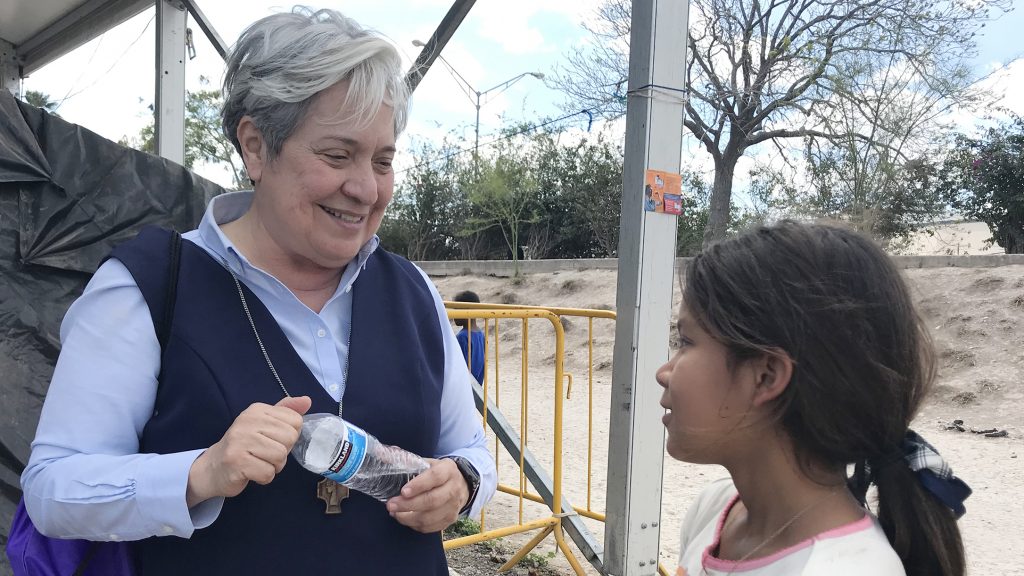More than 1,500 people live in a tent city without running water or adequate sanitation at the border of Texas and Mexico, while they apply for asylum in the U.S. Coronavirus has arrived in the camp, a religious sister has said, which should call attention to the condition in which asylum seekers are living.
“These families are living in donated tents at the mercy of extreme weather. Here, the temperatures can rise above 100 degrees, and when it rains, the downpours knock down their only refuge and leave them in mud pits,”Sr. Norma Pimentel wrote in a July 5 op-ed for the Washington Post.
“Imagine living in such uncertainty, where even such basics as running water and a place to shower are nonexistent; where you have to depend on outside organizations for food, which you have to cook over a campfire. Like the prisons and nursing homes that have been breeding grounds for the virus in the United States, the camp is crowded with people who for now are not going anywhere.”
Pimentel, a sister of the Missionaries of Jesus, is director of Catholic Charities of the Rio Grande Valley, in Texas.
“Do not ignore the suffering occurring here,” she urged, explaining that the migrant camp in Matamoros, Mexico, has more than 1,500 men, women, and children, in a make-shift tent city, as they wait for their applications for admittance to the United States to be processed.
The camp has been in existence since last summer, after the federal government initiated the Migrant Protection Protocols (MPP), which allow U.S. officials to return undocumented migrants to Mexico pending adjudication of their claims for asylum.
Addressing the situation is more, not less urgent because of the coronavirus pandemic, she said, noting that the camp recorded its first positive case last week.
That the camp has remained free of coronavirus for so long was, she said, was “remarkable” and a testament to the dedication of volunteers working to serve the people enduring emotional and practical hardship.
While the one patient in the camp, a woman from the interior of Mexico, was quickly isolated and removed to a nearby medical center run by Doctors Without Borders, Pimentel said that the conditions make the camp a potential outbreak waiting to happen, and that because of the pandemic, the camp has become less safe.
Because of the pandemic, volunteer activity in the camp is limited to a small number, who are able to provide assistance with nourishment and some health care needs, Pimentel wrote.
“All this makes it even harder to keep the camps safe from the cartels and gangsters who continue to prey on these largely defenseless asylum seekers.”
The camp’s existence, said Pimentel, was the unnecessary consequence of the government’s asylum protocols, which itself fail to “address people with dignity.”
“We should not have people forced to wait for asylum — trying to find safety for themselves and their families — while camped outside in the elements for months at a time. It is contrary to our laws and the dictates of humanity.”
Pimentel said that “the story of these asylum seekers has faded from the front pages of U.S. newspapers and from television screens but the cruel and unfair situation continues.”
“It is time that we put an end to it, and to end the MPP policy. Until that happens, we will continue to help those who are defenseless, whose only real ‘crime’ is trying to seek protection for themselves and their families.”
The Trump administration has made several changes to asylum and immigration policy over the past 18 months, all of which have come under sustained criticism from the bishops of the United States.
In September 2019, after the Trump administration announced a rule limiting asylum eligibility to those who had already applied and been rejected for asylum in those countries passed through on their way to the U.S, Bishop Joe Vásquez of Austin, head of the U.S. bishops’ migration committee, issued a strong critique of the change.
Vásquez said the rule “jeopardizes the safety of vulnerable individuals and families fleeing persecution and threatens family unity” and “undermines our nation’s tradition of being a global leader providing and being a catalyst for others to provide humanitarian protection to those in need.”
In November 2019, Auxiliary Bishop Mario Dorsonville of Washington, who serves as chairman of the U.S. bishops’ Committee on Migration, and Sean Callahan, president and CEO of Catholic Relief Services, the bishops’ international relief agency signed a joint statement on the Trump administration’s changes to asylum policy.
Administration policy “undermines U.S. moral leadership in protecting vulnerable populations and risks further destabilizing the region,” they said.
“To preserve and uphold the sacredness and dignity of all human life, we cannot turn our back on families and individuals in desperate need of help.”
“In light of the Gospel, let us always remember we are invited to embrace the foreigner and to take care of this human person.”

